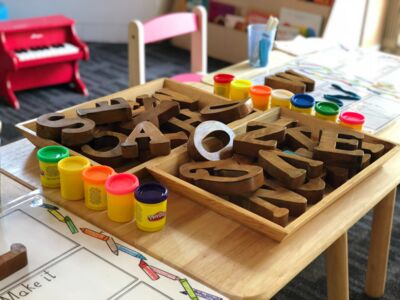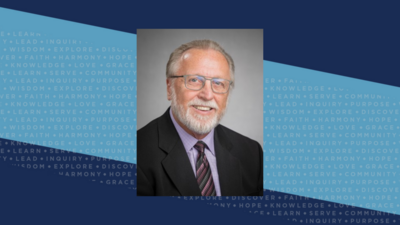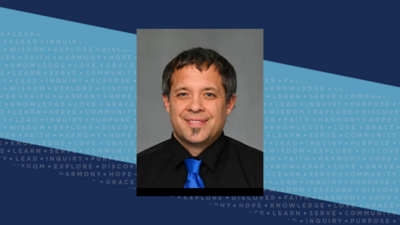Preschool Teachers, Play, and Partnering with Parents

Born to an orthodox Lutheran minister in the 19th century, Friedrich Froebel, also known as the Father of Kindergarten, was the first researcher and teacher to close his eyes and envision a classroom filled with young children who had endless opportunities, both inside and outside, to play as a means by which to learn. Play was so important to learning and social development, that he believed early childhood teachers needed to be carefully trained to observe children and plan for meaningful, play-filled experiences.
Froebel believed children are naturally curious and active. Through play, children explore, discover, make connections, and navigate their own learning. He believed teachers must know how to plan and implement learning experiences to actively engage children in explorations around language, literacy, math, science, social studies, creative arts, physical education, and faith development.
When I received my undergraduate degree from Concordia College in Seward, Nebraska I never imagined that I would be teaching in Lutheran early childhood education. It was the furthest thing from the plan I had negotiated with God. Obviously, I had a very naïve and clearly immature operating definition of divine negotiation. And, less than two years after graduating, I found myself sitting in the middle of the most delightful classroom of sixteen toddlers as their teacher in a Lutheran preschool in Southern California.
Looking back over nearly 40 years of service which included the birth of three sons, a granddaughter, two masters degrees, a doctoral degree, three leadership positions in parish preschools, and now preparing undergraduate and masters students for professional service in the field of early childhood education, the negotiations have ceased and I’ve conceded that God has a pretty good plan in mind for me. The joys and challenges of being a parent and partnering with my son’s teachers, have inspired and continue to shape the work I do to respect the young child as playful learner, value play, and partner with families.
Preschool teachers have the advantage of at least four years of training to prepare for your role in the classroom. On the other hand, in one day a young couple discovers that the nine months of preparing a beautifully blanketed, bumpered and ruffled crib, pastel painted walls, freshly washed layettes and receiving blankets provide little guidance for sleep and experience deprived mothers and fathers. Yet, as parents begin to understand their child’s coos and cries with greater success, and children respond to parent’s voices and facial expressions, the parent is teaching, the child is learning, and the parent knows their child better than anyone else.
Early childhood education (or ECE) teachers value parents as their own child’s first and most influential teacher and care must be taken to be sure that it is more than a cliché. Playful parenting in infancy as often seen in games like Pat-a-Cake and Peek-a Boo strengthens the bond between parent and child and sets the stage for socialization, thinking, language, problem-solving, and confidence building. Regardless of the advantages or disadvantages children face at home, the role of the parent cannot be diminished. Effective preschool teachers understand well God’s calling to parents and how He masterfully equips them to work together with you, their child’s teacher.
Be a part of the next class of educators.
The composition of the families you partner with today is very diverse. The nuclear family of mother and father is not typical. The children in our preschools, kindergartens, and primary classrooms will come from families that differ economically, racially, culturally, ethnically, and whose home language may not be English. They have religious differences, age differences, and expectations that differ. God has brought these precious children and families into your care.
Faith based programs, like our Lutheran early childhood preschools and schools, partner with families during the child’s formative years. You will witness first-hand that parent involvement contributes greatly to a child’s social, emotional and academic achievements. In fact, it doubles the likelihood of a child’s positive attitude toward learning and school, and is a positive predictor of later success. Some families may be less involved if they do not feel like they have something meaningful to contribute, or feel intimidated by a culture that might be different from their own.
It is important that you develop a relationship with your families, so that you can comfortably offer a variety of ways for them to be involved in their child’s education and faith-nurturing experiences at school and in their homes. As you get to know your families, you can invite them to share their experiences, special interests or work expertise with children in the classroom, and even as advocates in the community.
There are a variety of early childhood settings, Lutheran schools, faith-based schools, Head Starts, and for-profit childcare centers, which provide early education and care. There is a great need for professionals to serve in the field of early childhood education as a nanny, preschool, kindergarten and primary grade teacher, administrator, curriculum specialist, trainer, advocate, or family support worker. Matching your personal characteristics to the responsibilities and training requirements for different early childhood roles, allows you to be intentional in choosing an education plan to develop the professional skills needed for service.
Whether you are training to become an early childhood educator or earning a master’s ECE degree at Concordia University Nebraska, you will gain knowledge about child development and spend time observing, applying, and practicing the skills of teaching, and partnering with parents. You will be equipped as early childhood teachers for children birth through third grade, to plan and implement learning experiences, nurture the Lutheran faith, and to actively engage children in play-filled explorations around language and literacy, math, science, social studies, creative arts and physical education.
The ECE faculty at Concordia University, Nebraska is eager it meet you and assist you in reaching your professional goals as a new teacher, master teacher, or other professional seeking to gain valuable expertise in the field of early childhood education.


